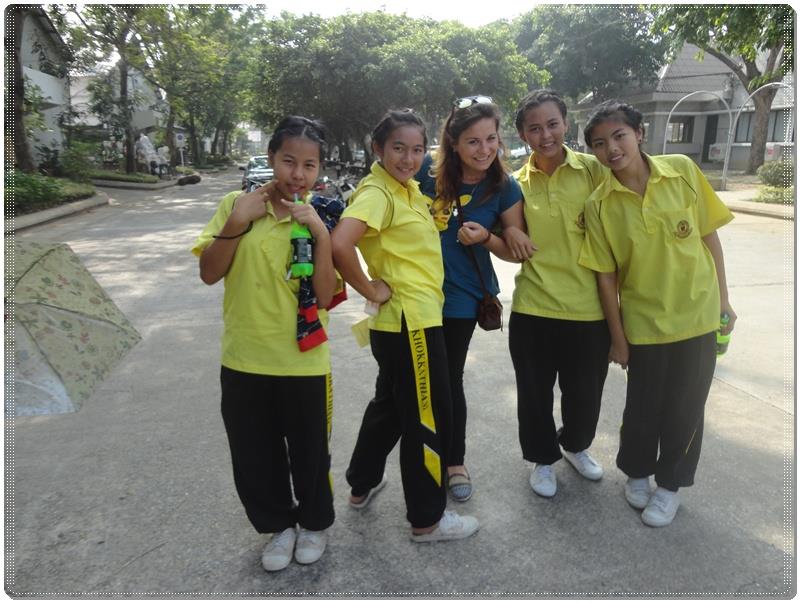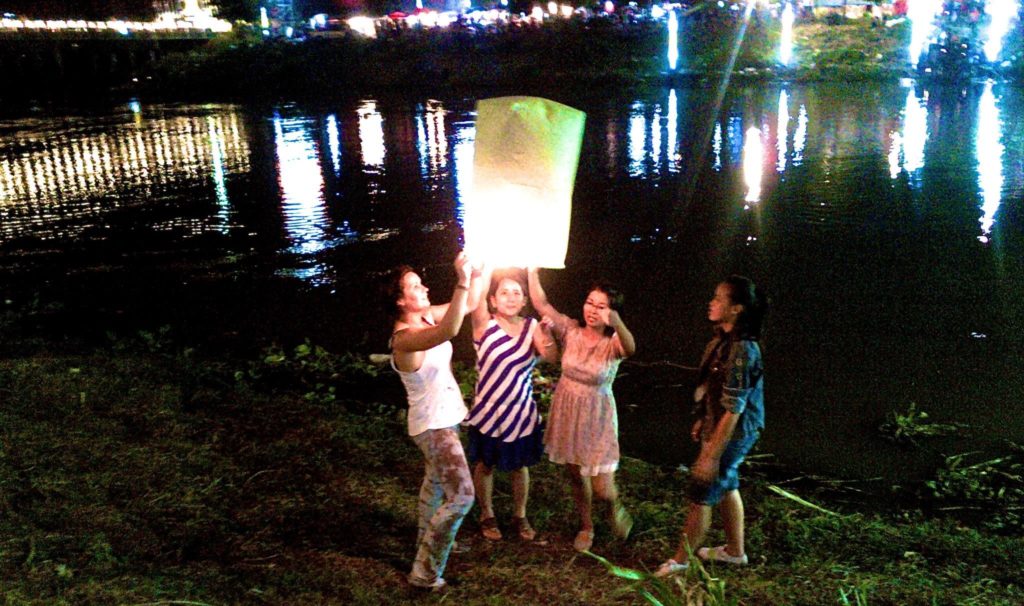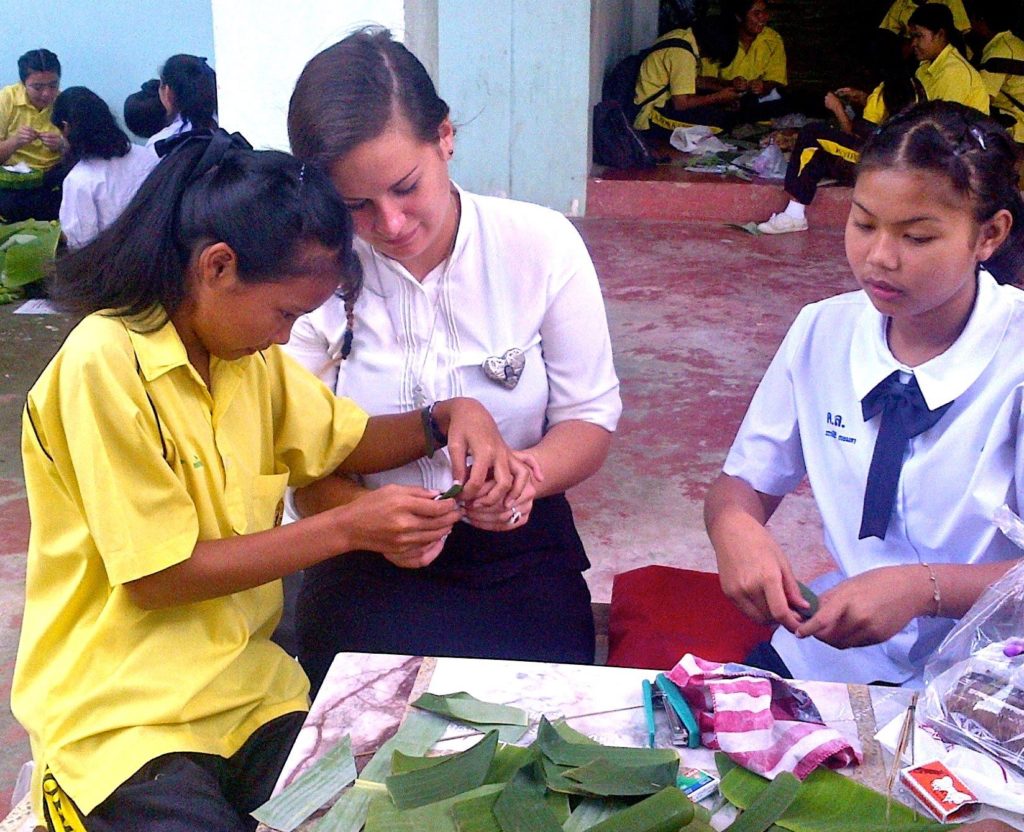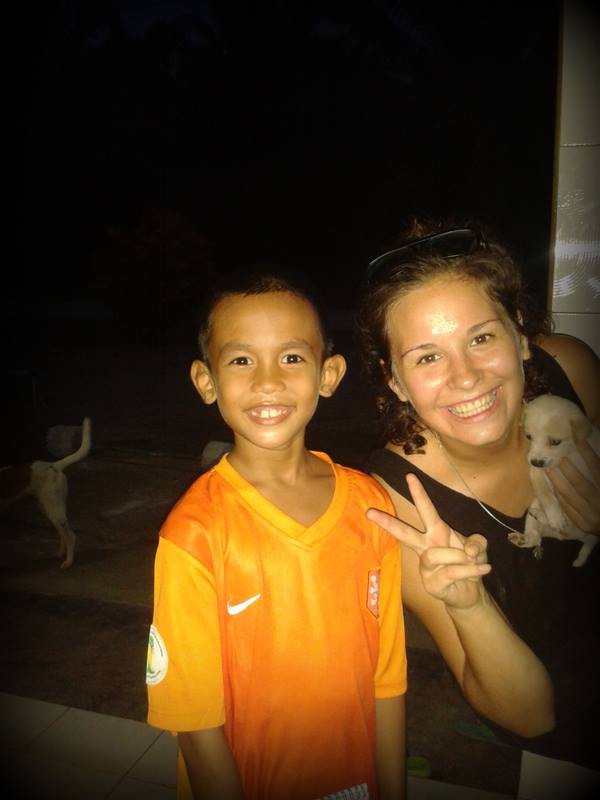9-5 got you down? Or perhaps you’re just finishing your studies and are not quite ready to chain yourself to that desk in that ‘exciting’ auditing firm who’s got a job advertised. Or maybe you’re a teacher looking at getting some experience far away from home. You’ve probably considered teaching English in Thailand – and for good reason too, who wouldn’t want to spend a few months (or years) in tropical country, rich in history, peppered with white sandy beaches, known affectionately as the “Land of Smiles”?
You’ll probably also be wondering if this really is as magical as it sounds. Lucky for you, our very own Saskia Smuts who looks after you once you’ve signed up to one of our programs has walked this exact road and she shares with you her experience in this quick interview…

Nick (N): Saskia, can you tell us a little bit about where you are from?
Saskia (S): I come from the warm and tiny town of Wellington, South Africa which is about an hour from Cape Town in the heart of the Winelands.
N: Stunning little town in a great location! Now, you taught in Thailand, when were you there?
S: I was there from 2013 to 2014 and came back to South Africa in September of that year. I first taught in Lop Buri (more or less 3 hours North of Bangkok, also known as monkey town) and then I moved to Phang Nga in the South of Thailand, about an hour away from Krabi and Phuket.
N: Wait, back that up, Monkey Town? You’ve got to tell me more about that!
S: So Muang Lop Buri, which is the main town in Lop Buri province is full of old beautiful temples, which in turn are run by hundreds of naughty monkeys, who love causing chaos. Old Town Lop Buri is what pulls all the tourists to the area, because everywhere you look there are monkeys on the telephone wires, monkeys in and on the temples, monkeys stealing phones, monkeys trying to rob the shops, monkeys that have been trained to perform, or monkeys stealing all your Big C shopping from your hands (yes I was an unfortunate victim). It’s safe to say I now have a bit of a fear of monkeys!

That being said, I loved living in the town! I learnt how to strategically avoid monkeys as well (I still look up whenever I walk underneath telephone/electricity wires), it became our weekly afternoon show on a Friday, cocktails and waffles at Nooms and monkeys terrorizing everyone around them! Oh and watching old Thai ballies [grandpas] come to the rescue was the best, running out of their shop with a broom hahahaha
N: That sounds like quite the adventure, wow! Certainly different to living in a small wine-producing town. Seeing that you didn’t know about where’d you’d be placed before you left, what were you most nervous about before leaving, I take it, it wasn’t surprise monkeys?
S: Haha, no! I was very young at that stage, having just turned 20, and I was nervous about meeting a bunch of people who were all older than me and more experienced. I went over with my brother, Xander, and I think my biggest fear was not being placed with him at the same school or in the same town. Luckily we did get placed in the same town, different schools, but I was glad he was nearby.
N: That’s great to hear that they could accommodate you like that! Now let’s talk about when you first arrived in Thailand, I’m guessing that’s when you felt most nervous! What was arriving in the country like?
S: We arrived late on the Friday afternoon, two days before the start of our TESOL, and as we arrived we were greeted by a cheery mix of people from all over the world having a beer on the veranda outside the H-Residence hotel. Immediately we were roped into our first experience, one of many nights out on Khao San Road. It was overwhelming, but so insane and such an awesome introduction to Thailand. We did all the seriously touristy Bangkok things like eat a fried scorpion, buy bracelets (which you end up having way too many of), had a bucket to drink and walked up and down Khao San whilst doing so. We then ended up on a stage in the infamous “The Club” and I ended up dancing on a stage with fellow participants who became some of my closest friends whilst I lived in Thailand, and some are still very very close friends.
N: That’s what this experience is all about, making those amazing friends! So, you all would have gone off to your orientation after that, what was the accommodation like there?
S: It was great, we had a pool, a little restaurant, air-conditioning and wifi, which was all we needed and wanted!

N: And how did that compare to the accommodation where you taught?
S: My first placement was a bit of a shock. I lived in an old Thai house on school property. It was quite dirty and kind of falling apart. I shared the house with a Chinese teacher and we soon turned it into an awesome home. We cleaned, bought a few things to make it more homely, fixed up a few things here and there – and even built our own braai [barbecue/grill] outside. It turned out to be so lovely with fairy lights, lanterns, a big table and chairs and even a tiny little garden just outside our kitchen. I ended up absolutely loving our house. When I moved to Phang Nga later in my Thailand teaching stint, I rented a lovely little apartment/house close to school right at the foot of a beautiful mountain. It was very modern and everything I needed with fast wifi and pumping air-conditioning.
N: Sounds like a little hard work, but it’s great to hear that you don’t have to be stuck with what you’ve got, you can really stamp your own style on your home and if you really want to, move to another town. So let’s talk about a typical day at school, what did that look like?
S: I use to get to school quite early. I would eat with all the students and answer millions of questions and laugh my head off with them, I’d then go to my office and have coffee with all the teachers – who spoilt me with yummy treats (yes I gained way too much weight because of this). We’d then attend assembly in the mornings where all the teachers would try their best to speak a few words of English to me. My first class of the day was always a bit of a challenge to just get into the flow of things (stage fright and all) but then my other 4 or 5 lessons would be a breeze! I’d have lunch with all the students and teachers around 13:00 and then do funny dance classes with them in the hall after school. Sometimes I would get pulled from classes to accompany some of the teachers on a fun adventure like going to a festival or the opening of a new temple – one day we even just went to take pictures in a beautiful field of sunflowers.
N: That sure is different to school back home! Was the lack of structure the hardest thing for you about teaching in Thailand?
S: I think the hardest thing was how people use to come and go. You would make amazing friends or meet incredible people and then a few months later they would leave for another destination or head back home.
N: I can imagine that must be pretty tough! So if that was the hardest thing, what did you enjoy most?
S: The food! I love chillies and I love coconuts… I was in food heaven. Oh my goodness and all the yummy fruits – they were to die for! I wish we had mango sticky rice in South Africa, I would literally end up being a big ball of mango stick rice though.
N: Haha yeah and without that hot and sweaty climate, it’s hard to sweat off those pounds! Next on my question list is a common one we get asked: were you ever worried about safety there?
S: At some points yes. This is only because I’m very cautious and like every country in the world I have to be vigilant, especially as a girl traveling alone. I was just always aware of my surroundings and the people around me, but nothing bad ever happened to me.
N: I’m glad to hear you had a safe experience! Now a lot of people who go to Thailand do so because of the travel opportunities, did you get to do much traveling while there?
S: Yes, I travelled all over Thailand, visiting and staying with friends I met on the TESOL course. I also got to go to Laos, Cambodia and Myanmar. Cambodia was for sure my favourite – Siem Reap and the Ankor Wat temples took my breath away!

N: Sounds incredible! So what made you want to come home?
S: I missed my family and had to come back to study and get a degree – it was something I wanted to do, and knew that I had to start at some point. Thailand prepared me mentally and helped me mature into a more responsible and determined young woman. This gave me the focus and determination I needed to get focussed on important things I wanted to achieve in my life.
N: Makes total sense! So it sounds like teaching English in Thailand was exactly right for you, what type of person would it not be right for?
S: If you’re not open minded and ready to learn a lot about yourself, other people, cultures and the world, Thailand definitely won’t be the right choice for you.
N: So with that in mind, what advice would you give someone considering teaching English in Thailand?
S: Keep your heart and mind open. Expect the unexpected, try not to have too many preconceived ideas, but rather leave yourself open to what will be. Approach every class you teach and even every travel moment with as much happiness as possible and try to always see the fun in everything.
N: Wonderful words Saskia! Thanks so much for sharing!
Interested in Teaching English in Thailand? We’ll send you more info!
Or have you thought about teaching English in South Korea? If you’ve got a bachelor’s degree and can commit to 12 months abroad, it’s a great way to earn a living whilst experiencing a fascinating culture. Click to read about Grace’s experience teaching in South Korea.


What is the break down of how much fiances i will need to kick off going to Thailand. What will i need to pay before going ?
Hi Melissa, thanks for reaching out. We currently recommend about R55,000 in pocket total for everything from fees to flights and living expenses in Thailand until you start getting paid. This is the current recommended amount considering the exchange rate.
Find more on that here: https://travelbud.com/teach-english-in-thailand/how-much-money-does-it-cost-to-teach-english-in-thailand/
And more on salaries here: https://travelbud.com/teacher-talk/teach-english-abroad-paid-salary/